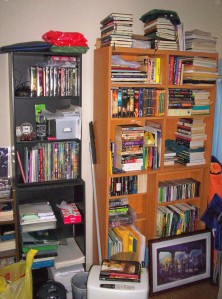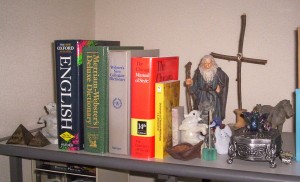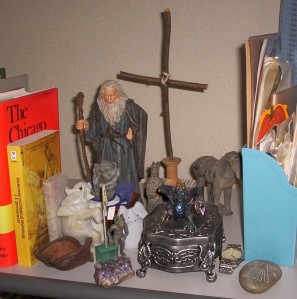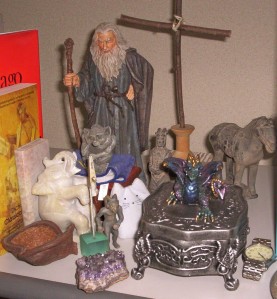So, how is it that we’ve come along for more than a year without a posting dedicated entirely to books — especially since books are so central to the writing and reading life? Probably because it’s such a big topic. Well, now is the time to open that mighty can o’ worms, because it’s reading season!

"So many books, so little time."
In Japan, people say fall is the season for reading books. I’d guess most of us gathered here around this blog feel that books are always in season. For me, there’s no season like spring/early summer for making me want to immerse myself in a book. The love is there year-’round, but there’s something about the first arrival of warmer seasons — a time of so much promise and possibility — that makes it all the more urgent. Again, it’s all about doorways into summer — into the time of velvet nights and blazing sun, lost paths and silhouettes and icy blue shade.
I’ve always been extremely unusual as a reader/writer, because I’m such a walking contradiction. I absolutely love books — no one would deny that; but I’m also a glacially slow reader. Everyone else I know who loves books as much as I do tends to chain-read them: to devour book after book after book. I’m notorious for inching along. (A friend recently asked me with a cheerful smile, “So, what book are you going to read this year?”)

These two huge plastic drawers are also full of books waiting to be read. But the real book-trove, because of the "slings and arrows of outrageous fortune," is now back in Illinois: I have an entire room there stuffed with books. Oh, to have them all beneath one roof someday!
I think it has to do with how much I love books as objects. I love the idea of books. I feel better just knowing that books are around. I love the heft and feel of them, the covers and the pages, the paper quality, the way the words look on the page, those amazing things like tables of contents and forewords and dedications and title pages. . . .
When my cousin and I were little, we’d often read books together (different books, same room). It was like John Henry racing the steam drill. I’d be relishing a certain page, and he’d be zooming along, the bulk of the book steadily vanishing from his right hand and accumulating in his left. I’d enviously ask him how he did that. As he explained it, he’d sort of take in whole paragraphs at once instead of individual words. And he thought it was funny how I’d periodically declare “Cover-Staring Time” (that’s what I called it), when I’d close my book and admire the cover for awhile. [I guess that might have answered my own question: to get through the book, you have to be looking at what’s inside. . . .]
But it’s always felt so wrong to me to race through a book! There are all those beautiful words, with their sounds and nuances, and they’ve been arranged precisely as they are for a purpose. It’s always seemed crucially important to me to appreciate that purpose, to absorb everything from the text that the writer intended, and perhaps more.

My essential reference shelf: dictionaries (Oxford and Webster's), The Chicago Manual of Style, and Zimmerman's Dictionary of Classical Mythology.
Yes, two or three times over the years I’ve tried to teach myself speed-reading. I’ve read books on the subject (not just stared at their covers!), practiced the techniques and all. But when I’ve tried to apply that to a real book, I’ve inevitably slowed back down.
I’m not criticizing you, all you who read like the wind, like Hermes on roller skates. I know the beauty of what you do is that you can come back again and again to revisit the books you love. You can pass this way more than once! I do envy you . . . I want to be just like you when I grow up. I’m serious. That same friend who asked me about what book I’m going to read this year also advised me of one key to getting things read: “You have to make it a priority.” That’s true. I don’t have any fewer hours in the day than anyone else. I just don’t use enough of mine for reading. Maybe this will be the year that I can make a change!
On the other extreme, though, to give this discussion some balance: one of my high-school friends used to race through books, all the big fantasy series that abounded in that decade. We’d ask him what he thought of this one or that one, and he’d say, “Oh, I don’t know. I read it, but I didn’t pay attention to it.” So . . . maybe it’s better to just read one book a year, if you’re paying close attention to it. What do you think? You be the judge.
A famous writer whose identity escapes me now, in advising other writers, said, “Don’t read a hundred books. Instead, read your ten favorite books ten times each, really paying attention.” I think there’s a lot of wisdom in that. “The mill-wheels of God’s justice turn slowly, but they grind exceeding fine.” I suppose I do that with books: I grind them exceeding fine.
Grrroinnk!

Knickknacks.
Room-Staring Time! This picture shows some knickknacks on my shelf. There’s Gandalf, of course, who needs no introduction. The cross was made from wood from the maple trees at the northeast corner of our yard in Illinois, under which I sat to write the poem “Glory Day,” which I still think is my best poem. The cross is standing in a spool from my mom’s sewing basket, and the base it stands on is a piece of plank from the barn I played in as a kid. There’s a thoughtful little gargoyle, a bean-bag cat, a terra-cotta warrior and his terra-cotta horse (bought at an exhibit I saw of the real things here in Niigata). There’s a box with a dragon on the lid. And see the little goat-man? That came as a premium, attached to a plastic jug of Diet Pepsi or Coke. It’s the “Goat Man,” part of a series of plastic replicas of paranormal beings. But for me, that figure became the character Gadmus in my NaNoWriMo novel Corin Booknose. Okay–ungroink–back to our regularly-scheduled discussion:
 A week or two ago, a faithful reader requested reading lists. It’s a bottomless well, an insurmountable task, but let’s go there. We have to understand from the outset that there’s no way we’ll get everything essential onto the lists. But I think we can make helpful lists of some of the very best books out there. I think I’ve talked enough for this time around: I’m going to save my own picks for next time. But feel free to start jumping in: give us a list of any reasonable length — 3, 5, a dozen, 20 books — the books that belong on the small shelf; the best books you’ve discovered in your lifetime, be it short or long. Yes, this blog lies in the native country of fantasy, but you’re not required to limit yourself to that genre. You don’t have to worry about ranking them in order (unless you want to), and I think we all agree that The Lord of the Rings and Watership Down are there already.
A week or two ago, a faithful reader requested reading lists. It’s a bottomless well, an insurmountable task, but let’s go there. We have to understand from the outset that there’s no way we’ll get everything essential onto the lists. But I think we can make helpful lists of some of the very best books out there. I think I’ve talked enough for this time around: I’m going to save my own picks for next time. But feel free to start jumping in: give us a list of any reasonable length — 3, 5, a dozen, 20 books — the books that belong on the small shelf; the best books you’ve discovered in your lifetime, be it short or long. Yes, this blog lies in the native country of fantasy, but you’re not required to limit yourself to that genre. You don’t have to worry about ranking them in order (unless you want to), and I think we all agree that The Lord of the Rings and Watership Down are there already.
Have at it! What book covers should I be staring at?